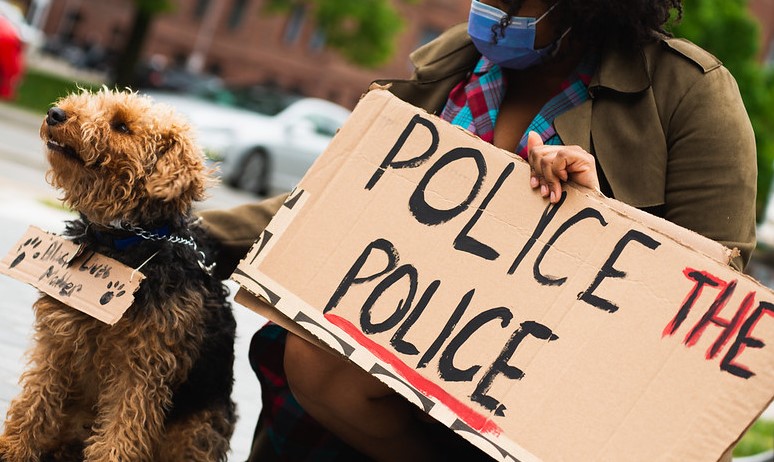photo by Jason Hargrove
Locating, tracking, and removing someone from inside the system can become necessary skills when you know someone arrested. Often protest aftercare is forgotten about, but is a vital part of ensuring we take care of those in our communities who put their bodies on the line in the fight against injustice. If you aren’t able to attend protests yourself for any number of reasons, this is one of many ways to stay involved without physically being present.
For the sake of brevity this article will be devoid of moralizing or incendiary language. Anyone has a legal right to protest, and anyone can be arrested for any number of reasons. However you feel about the cops is irrelevant and honestly information you should keep to yourself if in their custody or trying to get someone released, from a strategic standpoint.
Any person better serves their cause from outside the prison system, let alone in the custody of those whose abuse of power they may be protesting.
This article is based on my own experience doing this work with Join The Impact Chicago in 2012 and on a one-on-one basis since then, and isn’t legal advice; check with your lawyer about best practices before arrest if possible. Any constructive criticism or additions are welcome, as its only goal is to better enable community members to aid those arrested at protests.
Getting arrested is dangerous, especially for black and brown people. White protestors should understand that their job is to create a physical barrier between police and people of color, that includes keeping them out of the back of a cop car. That being said, everyone should plan in case of arrest. It’s an important safety measure, and you can help the movement by being someone’s one call after protest arrest.
You may be volunteering to help a solo friend going on their first march, or mobilized members of an organization. Either way, it’s important to talk about what form of protest they plan to take before they demonstrate.
Before volunteering for this, please consider:
- Be real with yourself about the time demands this might require. You may be calling the police station for hours, up until the next morning working to even find your protester. Once it’s your job you should plan to see it through to their release.
- Be real with yourself about the fact that you may have to interact with the police quite a bit. They’re the ones running the show, so if that’s going to be an issue you can’t deal with emotionally this may not be the job for you. I’m not here to judge, just asking people to be honest with themselves about how that will affect them.
- Who are you helping? Are you working with an established organization who has mobilized their members for a march, or a single friend who wants to go solo to their first march? What support network are you working within? Use the following information through the lens of how you’re able to help who you’re looking to help.
- Are you prepared to be responsible for the well-being of another person for whatever time between their arrest and release? Will you provide long-term support for them alone, or do you have a network you can rely upon for help?
- Do you have any special skills that can be useful, such as knowledge of multiple languages or ASL? Definitely consider how those skills can be used!
Before they head out to protest:
- The envelope: get a piece of paper with the following information on it in a sealed envelope from each protester you’re working with, and only open it if they are arrested:
- Legal name as is on their ID
- Date of birth
- Any underlying medical conditions
- Medications being taken, which doctor prescribed them, & how much they’re bringing with them (make sure it’s a limited supply in the original prescription bottle with their legal name on it)
- Name & number of their lawyer, or pro bono legal services able to help
- Job’s name & number if you may need to call out for them
- Numbers of family members/friends to contact
- A bailbondsman if needed or who to call with the money to bail your protester out
- The name & number of anyone they’re planning to have drive them hope post-release
- Your phone number should be written somewhere on the protester’s body in permanent marker where it’s not visible on the street but also won’t sweat off, and will be visible to the protester if needed. If they’re using the buddy system at the protest (which they should!) their buddy should also have your number to call if they witness the protester getting arrested.
- As a measure against arrest and police violence, know who will have their phone available, if anyone will, at the protest, and know how often they’d like you to check in and/or update them with breaking information about the route, arrests, etc. (BE CAREFUL WITH BRINGING YOUR PHONE. If anyone brings a phone make sure they’re aware of their rights, surveillance risks, and how to make a Faraday Cage.) If they can also memorize your phone number, that’s great!
- Know what their aftercare plan is for post-release.Talk beforehand, if possible about, who you’re going to call in case of arrest and in what order. Know if they already have a lawyer or will need one, know who is paying their bail, and if they need your help pre-arranging either of those points because it will be worse to try to figure it out post-arrest.
- If you’re not able to plan ahead for the above, it is helpful to know what local resources are available as far as community bond funds, pro bono lawyers or legal aid.
If they are arrested:
- If you get the call from your Arrested Person (AP) in booking, either enable the plan you discussed before or try to get the pertinent info from them on who to call. Find out where they’re being held, on what charges, and if they’ve been given any information on bonding out.
- Call the precincts to find out where they’ve been taken. This could take hours, so prepare for a lot of non-answers if the police don’t just hang up on you outright. If you have an action network, this can be useful for support with calling in; someone’s going to get the answer eventually of where your AP is, presumably. Once you’ve located them, get the relevant info from above.
- This is a great time to remind them not to say ANYTHING to police without their lawyer present (it’s your legal right and it should get exercised in this circumstance). Even if they’re innocent, wrongly accused, or in the moral right, anything they say CAN and WILL be used against them; lying to an FBI agent is going to land you further charges, for example, and they might be called in to question your AP depending on the arrest’s circumstances. Remind them not to be goaded into a response.
After arrest:
- Find out when they’re being released and arrange a ride home for them. Helpful things to bring along to a pickup can be: portable phone chargers & cables, water bottles, snack bars/food, hand sanitizer, masks, baby wipes, any needed medical supplies (medications, bandages, icy hot, etc).
- Whoever picks up your AP should document any officer info and bodily harm (with clear, well-lit photographs). This information should be given to their lawyer.
- Check in on your AP to make sure they’re home safe and feel as okay as is possible in that moment. Arrange to do something caring for them, (I’m a nurturer by nature, but it’s good community care practice), like making sure they have food and are prepared to self-isolate during COVID-19, if possible.







Be First to Comment